Emerging Investigator Series
Emerging Investigator Recipients
January, 2024
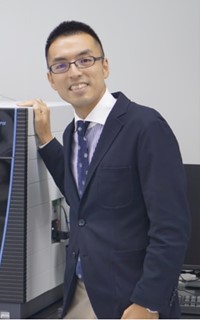 Shohei Hattori is a Tenured Associate Professor at the International Center for Isotope Effects Research Center (ICIER), Nanjing University, China. He is Japanese and earned his Ph.D. from the Tokyo Institute of Technology (Tokyo Tech), Japan. Before joining Nanjing University, he served as an Assistant Professor at Tokyo Tech from 2013 to 2021. Shohei is an Isotope Geochemist with a broad interest in various topics within Environmental Geochemistry, including atmospheric chemistry, biogeochemistry, and cryosphere sciences. His motivation extends beyond specific "spheres" (such as the atmosphere, biosphere, cryosphere, etc.) and "phases" (gas, liquid, and solid phases) to encompass the Earth system. His original research paper, titled “Latitudinal Difference in Sulfate Formation from Methanosulfonate Oxidation in Antarctic Snow Imprinted on 17O-Excess Signature” was published in Applied Geochemistry. This paper is featured in the Emerging Investigator Series and has been selected as the Editor’s Choice
Shohei Hattori is a Tenured Associate Professor at the International Center for Isotope Effects Research Center (ICIER), Nanjing University, China. He is Japanese and earned his Ph.D. from the Tokyo Institute of Technology (Tokyo Tech), Japan. Before joining Nanjing University, he served as an Assistant Professor at Tokyo Tech from 2013 to 2021. Shohei is an Isotope Geochemist with a broad interest in various topics within Environmental Geochemistry, including atmospheric chemistry, biogeochemistry, and cryosphere sciences. His motivation extends beyond specific "spheres" (such as the atmosphere, biosphere, cryosphere, etc.) and "phases" (gas, liquid, and solid phases) to encompass the Earth system. His original research paper, titled “Latitudinal Difference in Sulfate Formation from Methanosulfonate Oxidation in Antarctic Snow Imprinted on 17O-Excess Signature” was published in Applied Geochemistry. This paper is featured in the Emerging Investigator Series and has been selected as the Editor’s Choice
(Read his full interview)
January, 2024
 Mang Lin is a Professor in the State Key Laboratory of Isotope Geochemistry at Guangzhou Institute of Geochemistry, Chinese Academy of Sciences (GIGCAS). He holds a Ph.D. in Chemistry from University of California San Diego and M.Sc. and B.Sc. in Environmental Sciences from Sun Yat-Sen University. Prior to joining GIGCAS, he was a JSPS postdoc fellow at Tokyo Institute of Technology. Lin’s expertise and research interests are in analytical and physical chemistry related to multiple oxygen and sulfur isotope systematics and their applications in Earth and planetary sciences. He received the D.F. Hou award, CIFAR Global Scholar, and NSFC award of distinguished young scientists. His recent paper entitled “40 years of theoretical advances in mass-independent oxygen isotope effects and applications in atmospheric chemistry: A critical review and perspectives” was published in the special issue “Atmospheric Geochemistry” of Applied Geochemistry, selected as the Editor’s choice, and featured together with the Emerging Investigator Series.
Mang Lin is a Professor in the State Key Laboratory of Isotope Geochemistry at Guangzhou Institute of Geochemistry, Chinese Academy of Sciences (GIGCAS). He holds a Ph.D. in Chemistry from University of California San Diego and M.Sc. and B.Sc. in Environmental Sciences from Sun Yat-Sen University. Prior to joining GIGCAS, he was a JSPS postdoc fellow at Tokyo Institute of Technology. Lin’s expertise and research interests are in analytical and physical chemistry related to multiple oxygen and sulfur isotope systematics and their applications in Earth and planetary sciences. He received the D.F. Hou award, CIFAR Global Scholar, and NSFC award of distinguished young scientists. His recent paper entitled “40 years of theoretical advances in mass-independent oxygen isotope effects and applications in atmospheric chemistry: A critical review and perspectives” was published in the special issue “Atmospheric Geochemistry” of Applied Geochemistry, selected as the Editor’s choice, and featured together with the Emerging Investigator Series.
(Read his full interview)
June, 2022
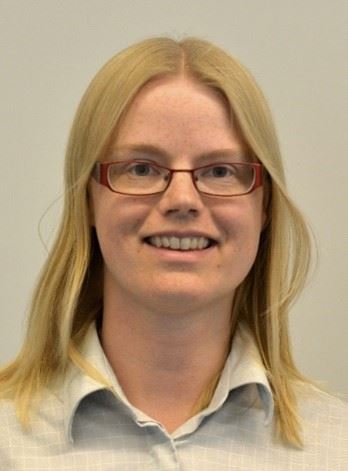 Carin Sjöstedt is a researcher at the Department of Soil and Environment at the Swedish University of Agricultural Sciences (SLU), Uppsala, Sweden. She holds a Ph.D. in Land and Water Resources Engineering at the KTH Royal Institute of Technology, Stockholm, Sweden and a M.Sc. and B.S. in Environmental Science at Stockholm University, Sweden. Her expertise and interests are mainly in metal(loid) speciation in soil and water bodies, and has specialized in the techniques X-ray absorption spectroscopy and geochemical equilibrium modeling. Her recent paper "Evidence of the mineral ZnHAsO4· H2O, koritnigite, controlling As (V) and Zn (II) solubility in a multi-contaminated soil" was published in Applied Geochemistry, and is as an Editor's Choice featured with the Emerging Investigator Series
Carin Sjöstedt is a researcher at the Department of Soil and Environment at the Swedish University of Agricultural Sciences (SLU), Uppsala, Sweden. She holds a Ph.D. in Land and Water Resources Engineering at the KTH Royal Institute of Technology, Stockholm, Sweden and a M.Sc. and B.S. in Environmental Science at Stockholm University, Sweden. Her expertise and interests are mainly in metal(loid) speciation in soil and water bodies, and has specialized in the techniques X-ray absorption spectroscopy and geochemical equilibrium modeling. Her recent paper "Evidence of the mineral ZnHAsO4· H2O, koritnigite, controlling As (V) and Zn (II) solubility in a multi-contaminated soil" was published in Applied Geochemistry, and is as an Editor's Choice featured with the Emerging Investigator Series
August, 2021
 Jaime Cesar is a Research Scientist at the Geological Survey of Canada, Calgary. Jaime combines molecular, compound-specific, and site-specific stable isotope tools to study organic compounds from petroleum basins and other environments to optimize the exploration and production of hydrocarbon resources and perform paleo-environmental reconstructions. Jaime’s research is part of the Geoscience for New Energy Supply (GNES) program funded by Natural Resources Canada (NRCan). His recent paper “A novel isotopic approach to distinguish primary microbial and thermogenic gases in shallow subsurface environments” was published in Applied Geochemistry, and is featured with the Emerging Investigator Series.
Jaime Cesar is a Research Scientist at the Geological Survey of Canada, Calgary. Jaime combines molecular, compound-specific, and site-specific stable isotope tools to study organic compounds from petroleum basins and other environments to optimize the exploration and production of hydrocarbon resources and perform paleo-environmental reconstructions. Jaime’s research is part of the Geoscience for New Energy Supply (GNES) program funded by Natural Resources Canada (NRCan). His recent paper “A novel isotopic approach to distinguish primary microbial and thermogenic gases in shallow subsurface environments” was published in Applied Geochemistry, and is featured with the Emerging Investigator Series.
June, 2021
January, 2021
|
Open Call: Emerging Investigator Series
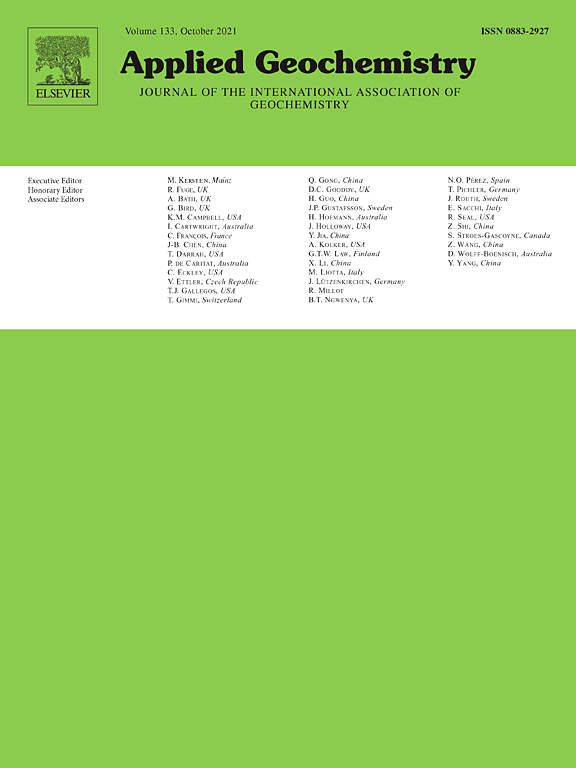 We are delighted to announce the Emerging Investigators Series in our Society's journal, Applied Geochemistry. The aim of the Series is to highlight excellent work by independent researchers in their early career that bring new insights into the field of geochemistry or to promote geochemical applications. Multidisciplinary work related to applied geochemistry, biogeochemical processes, and environmental geochemistry are also highly welcomed. Featured articles as well as the authors as emerging investigators will be extensively advertised to diverse disciplines and communities through multiple platforms of the journal and the International Association of GeoChemistry. The selected Emerging Investigators will also be considered as candidates for the early career honors bestowed by IAGC and the editorial engagements with Applied Geochemistry.
We are delighted to announce the Emerging Investigators Series in our Society's journal, Applied Geochemistry. The aim of the Series is to highlight excellent work by independent researchers in their early career that bring new insights into the field of geochemistry or to promote geochemical applications. Multidisciplinary work related to applied geochemistry, biogeochemical processes, and environmental geochemistry are also highly welcomed. Featured articles as well as the authors as emerging investigators will be extensively advertised to diverse disciplines and communities through multiple platforms of the journal and the International Association of GeoChemistry. The selected Emerging Investigators will also be considered as candidates for the early career honors bestowed by IAGC and the editorial engagements with Applied Geochemistry.
Application
At the time of application, applicants should have completed their PhD (or equivalent degree) within the last 10 years, and have an independent career. Apply to the Emerging Investigators Series by contacting Editors-in-Chief, Zimeng Wang with the following information:
- Your up-to-date CV with full name, affiliation, contact information. The CV should be no longer than 3 pages and include the education and career, a (selected) list of publications, professional achievement, honors and awards, and a website of applicant's group if available.
- A synopsis of the article intended to be submitted to the Series, including a tentative submission date. Please see https://www.journals.elsevier.com/applied-geochemistry for more information on the manuscript types and other instructions for authors. Regular research article, rapid communication, feature article, and critical review are all acceptable to the Series.
Review Criteria
Applications will be reviewed by the editors and the advisory board of the journal. The relevant criteria for reviewing will be based on the following:
- originality and novelty of the research
- scientific quality of the research
- potential for significant impact
- balancing factors related to inclusion and diversity
Schedule
This is an ongoing series with featured articles being added into the collection of Emerging Investigator Series continuously and displayed on the media of the journal and IAGC.

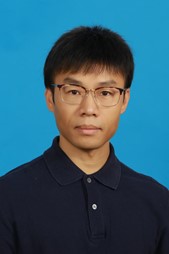 Wang Zheng
Wang Zheng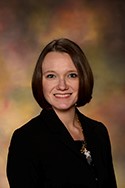 Lauren E. Beckingham
Lauren E. Beckingham